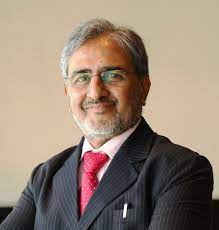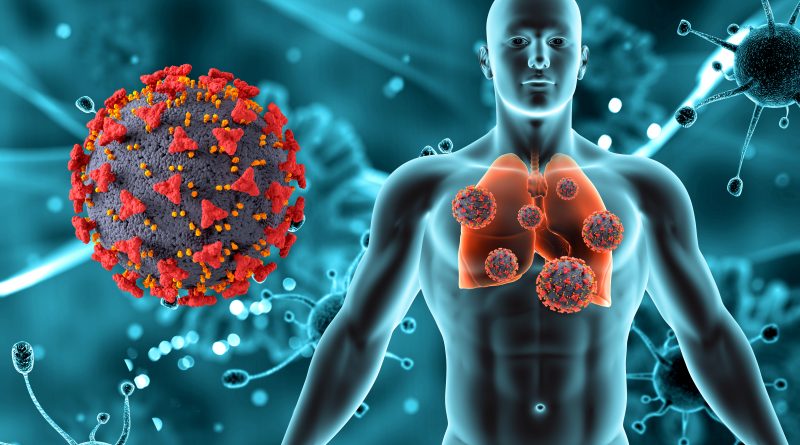Facing the Unseen
India’s successful management of the COVID-19 pandemic, highlights achievements in vaccination drives and low infection rates of emerging variants. But there is need to plug the gaps in the nation’s pandemic strategies, which require a recalibration in preparedness efforts to address ongoing concerns and potential future threats. We must embrace targeted strategies, and a holistic healthcare approach that takes care of the challenges and the crucial steps needed to build resilience in the face of uncertainties..
By Dr Ishwar Gilada..…
 India has managed the Covid-19 pandemic much better than many powerful countries. It boasts one of the most successful vaccination drives against Covid-19, with 75% of the population fully vaccinated and 35% having received a booster (third dose). The third wave, orchestrated by the Omicron variant, primarily with the BA.2 sub-variant, infected the majority of the population with minimal morbidity and mortality. In fact, BA.2 acted as a saviour for India, protecting against infections with BA.4, BA.5, and descendants like BA.2.86 (Pirola) and EG5 (ERIS).
India has managed the Covid-19 pandemic much better than many powerful countries. It boasts one of the most successful vaccination drives against Covid-19, with 75% of the population fully vaccinated and 35% having received a booster (third dose). The third wave, orchestrated by the Omicron variant, primarily with the BA.2 sub-variant, infected the majority of the population with minimal morbidity and mortality. In fact, BA.2 acted as a saviour for India, protecting against infections with BA.4, BA.5, and descendants like BA.2.86 (Pirola) and EG5 (ERIS).
We are now better prepared than ever before. India supports more than 50 countries in Africa and elsewhere with preparedness protocols, equipment, medicines, and vaccines. This contribution is unmatched globally in terms of assistance.
Every news report on Covid-19 seems to follow a ritualistic script: “We need not panic, but we should be cautious.” Unfortunately, this statement itself creates undue panic among people and adds confusion. What kind of caution do we expect from the common people?
Encouraging people to follow Covid Appropriate Behavior (CAB) seems futile, as no one adheres to or is inclined to do so. Fortunately, no travel restrictions were imposed even during the New Year and Christmas.
Although identified in August 2023 in Luxembourg and currently present in more than 40 countries, the coronavirus has neither caused significant morbidity nor remarkable mortality. Deaths are only observed in individuals with co-morbidities globally.
Initially thought to be more infectious, when India’s first JN.1 case was detected in Kerala, it has not proven to be so. We have only a few cases spread across 11 states in India in three weeks, and it is not driving overall numbers upwards. As of January 2, 2024, a total of 511 JN.1 #COVID19 cases have been detected in India.
However, the total active cases have decreased by 125 on the same day, indicating that JN.1 is less infectious than other existing variants. What the Indian SARS-CoV-2 Genomics Consortium (INSACOG) and respective authorities should do is provide the denominator to determine the percentage of JN.1. JN.1 numbers are high in five states: Karnataka with 199 cases, Kerala with 148 cases, Goa with 47 cases, Gujarat with 36 cases, and Maharashtra with cases of the JN.1 sub-variant. Other states with JN.1 detection include Rajasthan, Tamil Nadu, Telangana, Delhi, Odisha, and Haryana in that order.
There is neither clustering of infections with JN.1 nor is it yet a dominant strain of Coronavirus in India. The most dominant strain remains to be the XBB.1.16 sub-variant of Omicron. Though initially contemplated, JN.1 to be more infectious, when India’s first JN.1 case was detected in Kerala, in reality, it has not been found to be so. We barely have a countable few cases spread over 11 states in India in three weeks, and it is not driving overall numbers upwards. Until January 2nd, 2024, a total of 511 JN.1 #COVID19 cases have been detected in India.
However, total active cases have gone down by 125 on the same day, which means JN.1 is less infectious than other existing variants. What the Indian SARS-CoV-2 Genomics Consortium (INSACOG) and respective authorities should do is provide the denominator to calculate the JN.1 percentage. JN.1 numbers are high in five states – Karnataka has 199 cases, Kerala has 148 cases, Goa has 47 cases, Gujarat has 36 cases, and Maharashtra has cases of the JN.1 sub-variant. Other states with JN.1 detection include Rajasthan, Tamil Nadu, Telangana, Delhi, Odisha, and Haryana in that order.
There is neither clustering of infections with JN.1 nor is it yet a dominant strain of Coronavirus in India. The most dominant strain remains to be the XBB.1.16 sub-variant of Omicron.
Though initially contemplated, JN.1 to be more immune-invasive, in reality, nothing of that sort has happened or been established. So such fears are unfounded.
The presence of JN.1 has not increased demand for oxygen, hospital beds, ICU beds, or ventilators. It has caused a single death: a 48-year-old man from Dausa in Rajasthan on December 27th, and he had multiple comorbidities, including tuberculosis and silicosis with respiratory failure.
Symptoms in JN.1-affected patients are mild, no different than those in Omicron BA.2 or its other sub-variants. In fact, JN.1 symptoms pose a diagnostic dilemma with Influenza A (H1N1 and H3N2) and Respiratory Syncytial Virus (RSV), the latter two being more common. Ideally, the national program should focus on Influenza-Like Illnesses (ILI) rather than only being Covid-centric.
No fresh vaccination/Covid booster required or advised anywhere globally. Nor the vaccine for Omicron variant is easily available and stocks are miniscule.
No mask-mandate required. However masking can be requested for senior citizens and those with severe co-morbidities as well as those with such people at home and going in crowded places. Anyways, mask is helpful in preventing not only Covid-19 infection but also other viral and bacterial infections. Mask is also useful in preventing ill-effects of pollutants and allergens that are prevalent due to winter and altered Air Quality Index (AQI). Additionally, masking is advised for healthcare workers and those people who visit healthcare facilities, as they may encounter Covid-infected people there.
There is neither any need for any travel restrictions nor any curbs on social gatherings, meetings, conferences and religious gatherings. In fact, if imposed they can become counter-productive.
There is also no need for high-volume Covid testing. Only targeted testing (of suspected cases) is all that is required. And current marginal escalation in Covid cases in India is a result of increased testing.
Unless we get any fresh variant of Coronavirus, that is like or more severe than Delta variant, we need not worry. Omicron acted as a Variant of Support (VoS) for India and only after its entry two years backs our country opened-up, schools/colleges started, tourism took off, socialisation and conferences started and economy boomed to make our economy standout globally at number 5. That is because it has been a very mild variant – even less pathogenic than common cold, flu and RSV.
Preparedness is important and that should be part of pandemic preparedness – not mere COVID-preparedness. Genome sequencing should go on. Preparatory drills can also go on. No Covid bulletins required. No reservation of beds required. In fact that may cause collateral damage and affect other health conditions adversely, as was during the thick of pandemic times. Mere tuberculosis killed additional 495,000 people in 2021 alone, equivalent to the number of people died of Covid-19 during three years! Similarly there were lots of collateral damages during 2020-2022.
Till the World Health Organization-WHO declares JN.1 as a Variant of Concern -VoC, it should not bother common man – in fact they do not come in picture at all. Till it is only a Variant of Interest-VoI, it is only of interest (or if at all of concern) for the scientific community and nodal ministry in governments at the Centre and states.
No fresh vaccination/Covid booster is required or advised anywhere globally. Nor is the vaccine for the Omicron variant easily available, and stocks are minuscule.
No mask mandate is required. However, masking can be requested for senior citizens and those with severe co-morbidities, as well as those with such people at home and those going to crowded places. Anyways, masks are helpful in preventing not only Covid-19 infections but also other viral and bacterial infections. Masks are also useful in preventing the ill-effects of pollutants and allergens that are prevalent due to winter and altered Air Quality Index (AQI). Additionally, masking is advised for healthcare workers and those visiting healthcare facilities, as they may encounter Covid-infected people there.
There is no need for any travel restrictions nor any curbs on social gatherings, meetings, conferences, and religious gatherings. In fact, if imposed, they can become counter-productive.
There is also no need for high-volume Covid testing. Only targeted testing (of suspected cases) is required. The current marginal escalation in Covid cases in India is a result of increased testing.
Unless we get any fresh variant of Coronavirus that is like or more severe than the Delta variant, we need not worry. Omicron acted as a Variant of Support (VoS) for India, and only after its entry two years ago did our country open up, schools/colleges start, tourism take off, socialization and conferences begin, and the economy boomed to make our country stand out globally at number 5. That is because it has been a very mild variant, even less pathogenic than the common cold, flu, and RSV.
Preparedness is important, and that should be part of pandemic preparedness – not mere COVID-preparedness. Genome sequencing should continue, and preparatory drills can also proceed. No Covid bulletins are required, and no reservation of beds is needed. In fact, that may cause collateral damage and adversely affect other health conditions, as was the case during the thick of the pandemic. Mere tuberculosis killed an additional 495,000 people in 2021 alone, equivalent to the number of people who died of Covid-19 during three years! Similarly, there were lots of collateral damages during 2020-2022.
Until the World Health Organization-WHO declares JN.1 as a Variant of Concern -VoC, it should not bother the common man – in fact, they do not come into the picture at all. Until it is only a Variant of Interest-VoI, it is only of interest (or if at all of concern) for the scientific community and the nodal ministries in governments at the Centre and states.
(The author is a Consultant in HIV/STDs at Unison Medicare & Research Centre, Secretary General of the Peoples Health Organisation-India (PHO), and the Organised Medicine Academic Guild)

